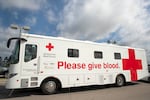
A mobile donation vehicle used by the American Red Cross. Red Cross implemented safety protocols for the pandemic, including spacing beds 6 feet apart, and requiring face masks and additional wipe-downs of donor areas.
Jason E. Miczek / Courtesy of American Red Cross
Dr. Greg Gottlieb recently retired and moved to the Columbia River Gorge to build his dream home.
As a busy anesthesiologist at Seattle Children’s Hospital, he hadn’t donated blood for years. But when he learned the pandemic was causing a shortage, he decided to help.
“I’m more than happy to share,” he said. “I certainly transfused my share of blood during my career.”
His first donation was made at a local blood drive in Hood River, Oregon. It took place in a large building with social distancing and masking rules, so Gottlieb felt safe. But his next appointment was in a bloodmobile, essentially an RV converted into a donation center. Gottlieb was bothered by the vehicle’s closed windows and what he perceived as slow air circulation. The room at the front of the bus where he gave his medical history was small and reminded him of an airplane lavatory.
The setup troubled Gottlieb, who is 66 and thus more vulnerable to the virus and its impacts, and so did the fact that the Red Cross is not requiring its volunteers and staff to get vaccinated.
“I said, ‘Hey, I would still like to be a donor, but I don’t interact indoors with people that aren’t vaccinated. Is your staff vaccinated?’” he said. “At which point, they offered to take me off the list of people that they’re going to call.”

Greg Gottlieb of Hood River, Ore., a retired doctor, doesn't feel bloodmobiles are safe enough for pandemic usage.
Kristian Foden-Vencil / OPB
Dr. Ross Herron, the chief medical officer for the Red Cross in a 15-state region that includes Oregon and Washington, said the charity is not covered by vaccine mandates because donors are not being treated for any kind of illness.
“The blood drive setting is not considered a health care setting,” Herron said, “because we’re not treating patients in those locations.”
In practical terms, that means that when Gov. Kate Brown’s vaccine mandate for health care workers takes effect Oct. 18, the Red Cross will not likely require employees be vaccinated.
“We do heavily recommend that our staff get vaccinated, but we have not mandated yet,” Herron said.
That contradicts the perspective of the Oregon Health Authority. When asked about the Red Cross by OPB, state health regulators sent back a written statement: “An individual who is drawing blood, even if it is for blood donation, falls within the definition of a healthcare provider … because they are having direct contact with a patient — the blood donor.”
The statement also said that mobile blood donation vehicle is no different from a hospital or medical office where blood is being drawn when it comes to COVID-19 transmission risks and guidelines. State rules define “healthcare settings” as including “…vehicles or temporary sites where health care is delivered (for example, mobile clinics, ambulances.)”
Safety steps
The Red Cross responded to OHA’s statement with its own. Nonprofit leaders said that while Oregon’s vaccination mandate does not appear to apply to Red Cross, they are working to clarify the situation with the state health agency.
Herron said the Red Cross does plan to comply with President Joe Biden’s’ order requiring workers at companies with 100 or more employees to get vaccinated or undergo regular testing. So far, there’s no set start date for that vaccine mandate.
As far as the safety of bloodmobiles, Herron said they weren’t used much at the start of the pandemic because of social distancing concerns. But the Red Cross installed air purifiers that remove virus particles and change the air inside up to three times an hour. The nonprofit also limited the number of people allowed inside a bloodmobile to 10 and set up an appointment system when they are used.
“We try not to use them too often,” Herron said. “But they do come in handy because a lot of the businesses we go to have blood drives, plus schools, like high schools and colleges, are no longer able to host blood drives.”
Donations from schools and colleges can make up as much as 30% of the blood supply in some communities.
Red Cross policy is to sanitize all equipment and surfaces touched by donors between appointments and to only collect blood from people feeling healthy. Red Cross officials say staff change gloves often, use sterile collection sets and masks, prepare donors’ arms with an aseptic scrub and provide hand sanitizer.
The Red Cross’s stance on the vaccine mandate and bloodmobiles differs from some of its competitors, like Bloodworks Northwest.
Executive vice president, Vicki Finson said Bloodworks is requiring staff get vaccinated, “By October 18th all of our staff will be vaccinated or under a medical, or deeply held religious believe, accommodation, which does require weekly testing.”
Unlike the Red Cross, Bloodworks stopped using bloodmobiles when the pandemic started -- because of social distancing concerns. Bloodmobiles used to be responsible for collecting about 60 percent of the nonprofits’ donations. Now pop-up centers, at places like Mariners Field in Seattle, are taking over.
Concerns about the use of unvaccinated employees and the safety of donations comes at a tough time for the Red Cross. Some people are wary of giving blood during a pandemic, and stocks are low.
In response, the charity is starting a media appeal.
“I’ve been in blood banking for over 30 years, and I can’t recall a time when we’ve had to go out on a media appeal during September,” Herron said. “It just is unheard of.”
Back in Hood River, Gottlieb remains frustrated. His AB Negative blood type is only found in about 1% of the population.
He said he’s happy to donate more blood, but not in a bloodmobile and not until all Red Cross staff are vaccinated.
